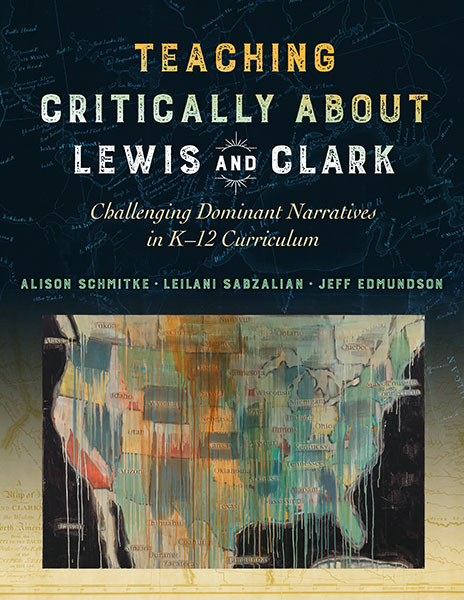Professors: Request an Exam Copy
Print copies available for US orders only. For orders outside the US, see our international distributors.
Alison Schmitke, Leilani Sabzalian, Jeff Edmundson
Publication Date: April 3, 2020
Pages: 216

The Lewis and Clark Corps of Discovery is often presented as an exciting adventure story of discovery, friendship, and patriotism. However, this same period in U.S. history can be understood quite differently when viewed through an anticolonial lens and the Doctrine of Discovery. How might educators critically interrogate the assumptions that underlie this adventure story through their teaching? This book challenges dominant narratives and packaged curriculum about Lewis and Clark to support more responsible social studies instruction. The authors provide a conceptual framework, ready-to-use lesson plans, and teaching resources to address oversimplified versions of the Lewis and Clark expedition. Indigenous perspectives, along with contemporary issues, are embedded in each lesson to encourage active and critical engagement with history and the legacies of conquest those living in what is now called the United States have inherited.
Book Features:
Alison Schmitke is a senior lecturer and director of the Educational Foundations Program at the University of Oregon. Leilani Sabzalian (Alutiiq) is an assistant professor of indigenous studies in education at the University of Oregon. Jeff Edmundson is a former high school teacher and recently retired after many years as director of the teacher education program at the University of Oregon.
“Not only are the lessons presented in this text practical and relevant to today’s teacher, but the text offers additional teacher resources that truly challenge the dominant narrative surrounding Lewis and Clark. The text supports teachers in understanding the multiple perspectives and vast history surrounding the Doctrine of Discovery. In addition, the resources offer voices other than those of Lewis, Clark, Jefferson, and other prominent white males, instead offering counternarratives. Inherently, the lesson plans and resources push students to dive deeper into the content at hand. Thus, they become active, engaged participants in their learning, leading to their evaluation and challenging of the dominant curriculum.”
—Teachers College Record
“The authors’ efforts to empower students, as both scholars and citizens, to learn and then reconceptualize dominant narratives of exploration and discovery will undoubtedly make the book an invaluable and controversial contribution to contemporary battles over history education.”
—Teaching History: A Journal of Methods
“This amazing book, and the thoughtful lesson plans included therein, should be required teaching materials in all K–12 classrooms in the United States. The unique and invaluable information that the authors provide will expose students to the federal law that still restricts Native Nations today and will require students to think more critically about this chapter of American history and what they have previously been taught on the subject. This book is revisionist history in the best sense of that tradition because it teaches students a more complete, more true, and more complex history about the Lewis and Clark expedition.”
—Robert J. Miller, professor, Sandra Day O'Connor College of Law, Arizona State University
“The story of the ‘Corps of Discovery’ remains one of the most persistent yet misunderstood historical narratives within K–12 classrooms. Teaching Critically about Lewis and Clark offers rare support for teachers, teacher educators, and schools ‘to challenge these issues, to defend tribal sovereignty, and to stand in solidarity with Indigenous peoples’ (p. 10). The book’s resources and strategies advance historical rigor, contemporary relevance, critical thinking about multiple perspectives, inquiry-based experiences, and alignment with state level initiatives like Montana’s Indian Education for All and Washington’s Since Time Immemorial, all while revitalizing Indigenous histories that have been marginalized or suppressed for 200+ years.”
—Christine Rogers Stanton, associate professor of K–12 social studies education, Montana State University
Contents (Tentative)
Acknowledgments ix
PART I: INTRODUCTION
1. Beyond Adventure 2
2. The Doctrine of Discovery 13
3. Unpacking Colonial Logics in Lewis and Clark Curriculum 26
PART II: ELEMENTARY LESSON PLANS
Elementary Lesson Plan 1: “We’re Still Here” 34
Elementary Lesson Plan 2: What Were the Goals of the Lewis and Clark Corps of Discovery? 39
Elementary Lesson Plan 3: The Jefferson Peace Medals 49
Elementary Lesson Plan 4: Sacagawea: Beyond Interpreter and Guide 58
Elementary Lesson Plan 5: “Everything Was Already Loved”: Complicating Science and Discovery 70
Elementary Lesson Plan 6: A Stolen Canoe Returned 83
Elementary Lesson Plan 7: A Closer Look at York’s Life 91
PART III: SECONDARY LESSON PLANS
Secondary Lesson Plan 1: The Stories Maps Tell 102
Secondary Lesson Plan 2: What Were the Goals of the Lewis and Clark Corps of Discovery? 111
Secondary Lesson Plan 3: Johnson v. McIntosh (1823) and the Doctrine of Discovery 123
Secondary Lesson Plan 4: Questioning American Progress (John Gast, 1872) 132
Secondary Lesson Plan 5: Standing Rock and the “Larger Story” 137
Secondary Lesson Plan 6: Role Play: The Bicentennial of the Lewis and Clark Corps of Discovery 148
Secondary Lesson Plan 7: Revisiting What We Know About York 162
PART IV: TEACHING RESOURCES
Teaching Resource 1: Native Lands Under Siege 175
Teaching Resource 2: Book Review: Piecing Me Together by Renée Watson (2017) 178
Teaching Resource 3: Partnerships Realized: The Confluence Project 180
Teaching Resource 4: Honoring Tribal Legacies: An Epic Journey of Healing 183
4. Conclusion 185
Appendix: The Standards 187
References 195
Index 201
About the Authors 205
Professors: Request an Exam Copy
Print copies available for US orders only. For orders outside the US, see our international distributors.